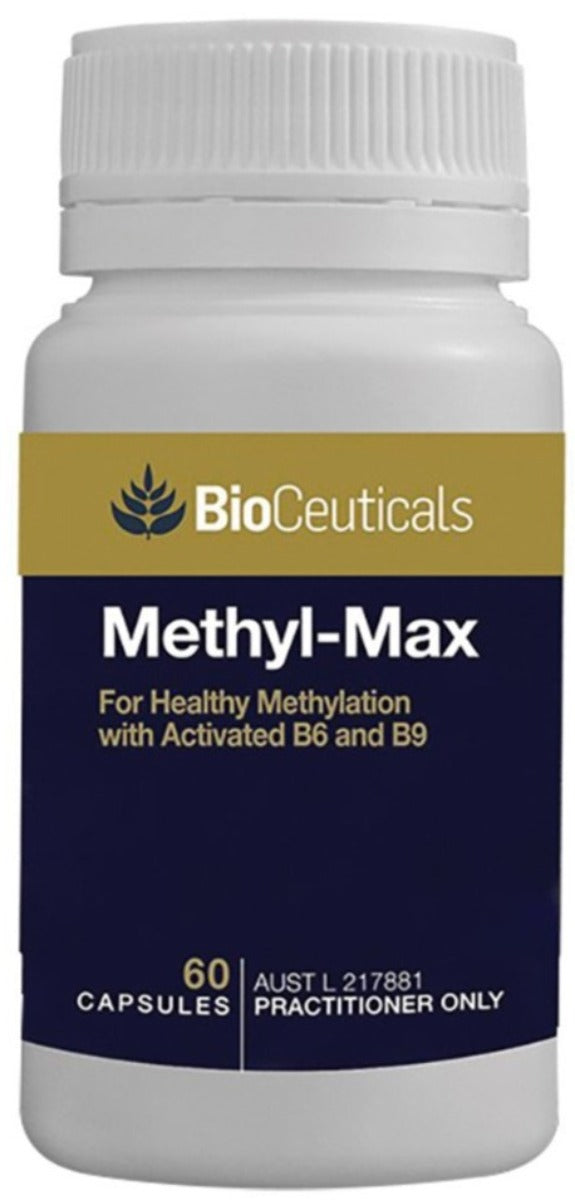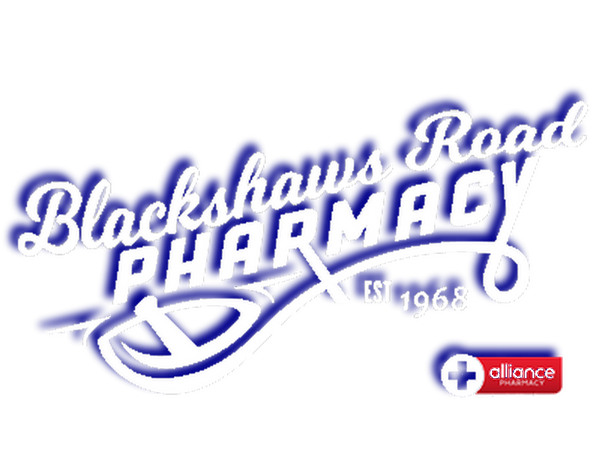BioCeuticals
BioCeuticals Methyl-Max 60 caps
BioCeuticals Methyl-Max 60 caps
Couldn't load pickup availability
For Healthy Methylation with Activated B6 and B9
As an alternative we recommend Metagenics Methyl-Active 90caps
BioCeuticals Methyl-Max 60 caps
- BioCeuticals Methyl-Max contains active vitamin B6, activated vitamin B9 (folinic acid), vitamin B12, riboflavin (B2) and serine; all required for functioning of the methylation pathways.
- Methyl-Max may help to maintain health of older individuals and pregnant women. Some older individuals may be at risk of developing vitamin B12 insufficiency and may benefit from supplementation.
BioCeuticals Methyl-Max has No Added Dairy, No Added Gluten, No Added Shellfish, No Added Soy Protein, No Added Yeast
BioCeuticals Methyl-Max is Pregnancy Frinedly, Vegan Friendly, Vegetarian Friendly
Dose
Dose: BioCeuticals Methyl-Max
Adults: Take 1 capsule daily or as directed by your healthcare practitioner.
Features
Features: BioCeuticals Methyl-Max
- May help to maintain normal healthy plasma homocysteine levels.
- Helps to form red blood cells, and used as a blood tonic to help maintain normal blood.
- May assist peripheral blood circulation.
- Helps support cognitive health and may assist in the maintenance of normal healthy memory function.
- Contributes to the normal growth of the foetus.
- Vitamins B6, B9 and B12 are involved in the function of the liver.
Ingredients
Ingredients: BioCeuticals Methyl-Max
| Each BioCeuticals Methyl-Max capsule contains: | |
| Serine | 50mg |
| Pyridoxal-5-phosphate monohydrate (P5P) (active vitamin B6) | 31.3mg |
| Riboflavin (vitamin B2) | 15mg |
| Cyanocobalamin (vitamin B12) | 500mcg |
| Calcium folinate | 694mcg |
| equiv. folinic acid (activated vitamin B9) | 500mcg |
Ingredient Summary
Ingredient Summary: BioCeuticals Methyl-Max
Methylation and homocysteine
Elevated levels of homocysteine are associated with increased risk of developing a number of conditions.[1-10]
Serine, folinic acid, and vitamins B2, B12 and B6 are involved in the metabolism of homocysteine.
The remethylation pathway of the methylation cycle actually involves methylation, re-methylation and de-methylation reactions involving folate, B12 and B2. By supplementing with folinic acid (5-formyl-THF), a number of reduction steps can be bypassed to convert directly to 5,10-methylene-THF, alleviating the need for the DHFR enzyme. Supplementing with folinic acid, therefore, assists 5,10-methylene- tetrahydrofolate reductase (MTHFR) enzyme to produce active folate (5-MTHF) which then methylates homocysteine; helping keep homocysteine converting to methionine and then SAMe, rather than elevating.
Riboflavin (B2) is an important nutrient supporting the MTHFR enzyme. Studies have shown that plasma riboflavin is a determinant of plasma homocysteine levels.[11,12]
Serine and B6 are involved in the methylation pathway as well as the transsulfuration pathway, where these nutrients are required for the conversion of homocysteine into cysteine and then ultimately glutathione (an important and powerful antioxidant).
Additionally, a daily dose of 400-500mcg of folinic acid – if taken daily for one month before conception and during the first trimester of pregnancy – reduces the risk of women having a child with birth defects of the brain, such as ancephaly, or spinal cord, such as the neural tube defect known as spina bifida.

DHF: Dihydrofolate; DHFR: Dihydrofolate reductase; THF: Tetrahydrofolate; MTHRF: Methylenetetrahydrofolate reductase; MS: Methionine synthase; SAMe: S-adenosyl-methionine; SAH: S-adenosyl-homocysteine; DMG: Dimethylglycine; CBS: Cystathionine-beta-synthase
Warnings
Warnings: BioCeuticals Methyl-Max
- If symptoms persist consult your healthcare practitioner.
- Do not exceed the stated dose except on medical advice. If you have had a baby with a neural tube defect/spina bifida, seek specific medical advice.
- Vitamin supplements should not replace a balanced diet.
- Always read the label. Use only as directed.
- If you have any pre-existing conditions, are on any medications, always talk to your health professional before use.
- Some products should be ceased at least two weeks before any elective surgery, please confirm with your health professional.
Companion Products
Companion Products: BioCeuticals Methyl-Max
- BioCeuticals AntiOX Excel
- BioCeuticals CardiNutrients
- BioCeuticals Iron Sustain
FAQ
FAQ: BioCeuticals Methyl-Max
Q. What is the difference between pyridoxine hydrochloride and pyridoxal-5-phosphate?
A. These are two different forms of vitamin B6. Pyridoxine hydrochloride is commonly used in vitamin B6 supplements. Once absorbed, it is oxidised to pyridoxal and then phosphorylated to pyridoxal-5-phosphate (P5P) in the liver. P5P is the activated form of vitamin B6. Administering vitamin B6 in the form of P5P circumvents any issues of compromised phosphorylation, as might occur when liver health is less than optimal.
Q. Why is there a caution on the use of vitamin B6 in high doses?
A. The long-term use of vitamin B6 at doses of 500-1000mg per day over several months has been associated with sensory neuropathy. There have been no reports of sensory neuropathy at doses less than 200mg per day. The upper level of intake specified by the National Health and Medical Research Council is 50mg of pyridoxine for adults. A daily dose of Methyl-Max provides 19.87mg.
References
References: BioCeuticals Methyl-Max
[1] Refsum H, Ueland PM, Nygard O, et al. Homocysteine and cardiovascular disease. Ann Rev Medicine 1998;49:31-62.
[2] Seshadri S, Beiser A, Selhub J, et al. Plasma homocysteine as a risk factor for dementia and Alzheimer’s disease. N Engl J Med 2002;346(7):476-483.
[3] Moschiano F, D’Amico D, Usai S, et al. Homocysteine plasma levels in patients with migraine with aura. Neurol Sci 2008;29 Suppl 1:S173-S175.
[4] Rochtchina E, Wang JJ, Flood VM, et al. Elevated serum homocysteine, low serum vitamin B12, folate and age related macular degeneration: the Blue Mountains eye study. Am J Ophthalmol 2007; 143(2):344-346.
[5] van Wijingaarden JP, Doets EL, Szczecinska A, et al. Vitamin B12, folate, homocysteine, and bone health in adults and elderly people: a systematic review and meta-analysis. J Nutr Metab 2013;2013:486186.
[6] Gallucci M, Zanardo A, Bendini M, et al. Serum folate, homocysteine, brain atrophy, and auto-CM system: the Treviso Dementia (TREDEM) study. J Alzheimers Dis 2013:PMID 24028866 [Epub ahead of print].
[7] Tucker K, Qiao N, Scott T, et al. High homocysteine and low B vitamins predict cognitive decline in aging men: the Veterans Affairs normative aging study. Am J Clin Nutr 2005;82:627-635.
[8] Herrmann W, Obeid R. Homocysteine: a biomarker in neurodegenerative diseases. Clin Chem Lab Med 2011;49(3):435-441.
[9] Durga J, van Boxtel MPJ, Schouten EG, et al. Effect of 3-year folic acid supplementation on cognitive function in older adults in the FACIT trial: a randomised, double blind, controlled trial. Lancet 2007;369:208-216.
[10] Higdon J. An evidenced-based approach to vitamins and minerals. New York: Thieme, 2003.
[11] Moat SJ, Ashfield-Watt PA, Powers HJ, et al. Effect of riboflavin status on the homocysteine- lowering effect of folate in relation to the MTHFR (C677T) genotype. Clin Chem 2003;49(2):295- 302.
[12] Hustad S, Ueland PM, Vollset SE, et al. 2000. Riboflavin as a determinant of plasma total homocysteine: effect modification by the methylenetetrahydrofolate reductase C677T polymorphism. Clin Chem 2000;46(8 Pt1):1065-1071.
[13] Braun L, Cohen M. Herbs and natural supplements: an evidence-based guide, 3rd ed. Sydney: Churchill Livingstone Elsevier, 2010.
Share


